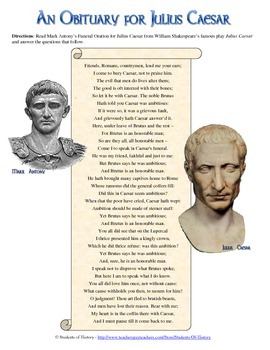

Even Casca sees various omens and believes that these are the warning signs about the likely dictatorship of Caesar. However, Caesar defers his visit to the Senate, choosing not to completely ignore his wife. When the soothsayer tells Caesar that he should beware the Ides of March, Caesar not only ignores him but also forgets it until Calpurnia, his wife, reminds him that she has had a very bad dream about him. However, the elite class often ignores such signs and berates the plebeians for this ignorance. Shakespeare has shown Romans believing strongly in omens and interpreting their fates through those signs and symbols. The significance of omens in Roman society at the time portrayed in the play is another major theme. Therefore, this game of competing perceptions about the hero and the villain of the play continues until the end, and herein lies the mystery of the popularity of the play.

By the end of the play, when Mark Antony defeats and kills Brutus, still, Mark Antony terms him the noblest of Romans, which is also ironic, for he has been already termed a villain involved in the murder of Caesar.

His turn comes when Mark Antony veiledly showers ironic praises on Caesar and berates Brutus, ironically presenting him a villain. On the other hand, Brutus terms himself as a very patriotic person who loves Rome more than he loves Caesar. Brutus’ speech after they have killed him paints Caesar as a villain rather than a hero. On the other hand, Brutus terms him as an ambitious person who is not fit to be a hero. Caesar becomes a hero for his performance in battle and in his humble way of refusing the crown. Caesar and Brutus inadvertently compete for it where one seems other and vice versa. One of the major themes of Julius Caesar’s concerns on how to distinguish between heroes and villains.


 0 kommentar(er)
0 kommentar(er)
